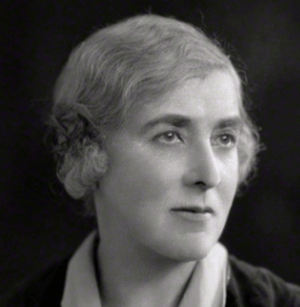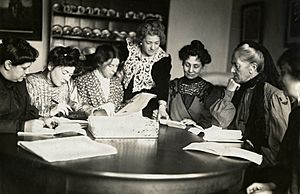Helen Archdale facts for kids
Quick facts for kids
Helen Archdale
|
|
|---|---|
 |
|
| Born |
Helen Alexander Russel
25 August 1876 Nenthorn, Scotland
|
| Died | 8 December 1949 (aged 73) St John's Wood, London, England
|
| Nationality | Scottish |
| Alma mater | University of St Andrews |
| Movement | Women's Social and Political Union |
| Spouse(s) |
Theodore Montgomery Archdale
(m. 1901) |
| Children | Betty Archdale |
Helen Alexander Archdale (born Russel; 25 August 1876 – 8 December 1949) was an important Scottish woman. She was a feminist, which means she believed in equal rights for women. She was also a suffragette, someone who fought for women's right to vote. Helen Archdale was a journalist too.
She worked for the Women's Social and Political Union (WSPU). This group worked hard to get women the right to vote. Helen was an organiser for their Sheffield branch. Later, she became their secretary for prisoners in London.
During the First World War, Helen Archdale helped women find new roles. In 1914, she started a training farm for women who wanted to work in agriculture. In 1917, she worked as a clerk for Queen Mary's Army Auxiliary Corps. This was a group that helped the army. In 1918, she moved to the women's department of the Ministry of National Service.
Contents
Helen Archdale's Early Life
Helen Archdale was born in Nenthorn, Scotland. Her mother was Helen Evans, who was one of the "Edinburgh Seven." This was a group of the first women to study at a British university. Her father was Alexander Russel, a Scottish journalist. He was the editor of a newspaper called The Scotsman.
Helen went to St Leonards School in St Andrews. Then, she studied at the University of St Andrews from 1893 to 1894. She was one of the first women to attend this university.
Marriage and Return to Scotland
In 1901, Helen married Captain Theodore Montgomery Archdale. He was working in India at the time. We don't know much about her life in India.
In 1908, she came back to Scotland. She quickly joined the Women's Social and Political Union (WSPU). In 1910, she became the organiser for their Sheffield branch. She also hired Adela Pankhurst to be a governess. In 1911, Helen moved to London. There, she became the WSPU's secretary for prisoners.
Helen Archdale's Journalism Career
Helen Archdale was also a talented writer and journalist. She worked on The Suffragette, a publication by the WSPU, starting in 1912. From 1915, she wrote for Britannia, which took over from The Suffragette.
In 1920, she became the first editor of a new magazine called Time & Tide. This magazine was started by Margaret Rhondda. In the 1930s, Helen wrote articles for other famous newspapers. These included The Times, Daily News, Christian Science Monitor, and The Scotsman.
Helping During World War I
During the First World War, Helen Archdale was very active. She held several important jobs. She started a training farm to teach women how to work in agriculture. In 1917, she worked as a clerk for Queen Mary's Army Auxiliary Corps. In 1918, she worked in the women's department of the Ministry of National Service. This department helped organise people for war efforts.
Helen Archdale's Political Work
Helen Archdale took part in a WSPU protest in Edinburgh in 1909. Later that month, she was arrested in Dundee. She was with Hannah Mitchell, Adela Pankhurst, Maud Joachim, and Catherine Corbett. They were arrested for disturbing a meeting held by Winston Churchill, where women were not allowed.
After their arrest, they went on a hunger strike. This meant they refused to eat. They were released after four days in prison because of health concerns. The prison staff decided it would be too difficult to feed Helen against her will.
In December 1911, Helen Archdale was sent to prison for two months. This was for breaking windows at Whitehall. Her daughter, Betty Archdale (1907-2000), remembered helping her mother collect stones. She also visited her mother in Holloway Prison.
The Six Point Group
Helen Archdale became the secretary, and later the international secretary, of the Six Point Group. This group was started by Margaret Rhondda. The group had six main goals to improve women's lives:
- Make better laws about child assault.
- Create better laws for mothers who had lost their husbands.
- Create better laws for unmarried mothers and their children.
- Give married parents equal rights to care for their children.
- Ensure teachers received equal pay.
- Give men and women equal chances in government jobs.
The Open Door Council
In 1926, Helen Archdale, Margaret Rhondda, Chrystal Macmillan, and Elizabeth Abbott started the Open Door Council. This group worked to give women equal chances in the economy. They focused on helping women become financially independent.
They were against "protective laws" for women. They believed these laws actually limited women. For example, they argued that such laws stopped women from getting better-paying jobs like mining. Helen was also active in the international version of this group, called Open Door International. It was founded in 1929.
International Work for Equal Rights
In 1927, Helen Archdale began working in Geneva, Switzerland. She worked to get an Equal Rights Treaty passed at the League of Nations in the early 1930s. The League of Nations was the first international group focused on keeping world peace.
She became the secretary of the Liaison Committee of Women's International Organisations. This group was formed in 1931. It worked to promote equal rights, reduce weapons, and get more women involved in the League of Nations. From 1929 to 1934, she led Equal Rights International. This group was founded in The Hague. It worked to get women equal rights in law and in the workplace. In the late 1930s, she was also involved with the World Women's Party.
Helen Archdale's Family Life
On 9 October 1901, Helen Archdale married Captain Theodore Montgomery Archdale (1875–1918). He was stationed in India at the time. Helen spent her early married life in Lancashire, England, and in India. They had two sons and one daughter.
Helen Archdale passed away on 8 December 1949. She died in London, England.
See also
 In Spanish: Helen Archdale para niños
In Spanish: Helen Archdale para niños


